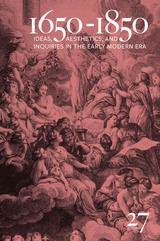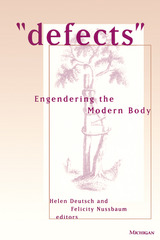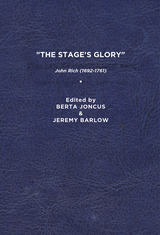3 books about Nussbaum, Felicity

1650-1850
Ideas, Aesthetics, and Inquiries in the Early Modern Era (Volume 27)
Kevin L. Cope
Bucknell University Press, 2022
Rigorously inventive and revelatory in its adventurousness, 1650–1850 opens a forum for the discussion, investigation, and analysis of the full range of long-eighteenth-century writing, thinking, and artistry. Combining fresh considerations of prominent authors and artists with searches for overlooked or offbeat elements of the Enlightenment legacy, 1650–1850 delivers a comprehensive but richly detailed rendering of the first days, the first principles, and the first efforts of modern culture. Its pages open to the works of all nations and language traditions, providing a truly global picture of a period that routinely shattered boundaries. Volume 27 of this long-running journal is no exception to this tradition of focused inclusivity. Readers will travel through a blockbuster special feature on the topic of worldmaking and other worlds—on the Enlightenment zest for the discovery, charting, imagining, and evaluating of new worlds, envisioned worlds, utopian worlds, and worlds of the future. Essays in this enthusiastically extraterritorial offering escort readers through the science-fictional worlds of Lady Cavendish, around European gardens, over the high seas, across the American frontiers, into forests and exotic ecosystems, and, in sum, into the unlimited expanses of the Enlightenment mind. Further enlivening the volume is a cavalcade of full-length book reviews evaluating the latest in eighteenth-century scholarship.
[more]

"Defects"
Engendering the Modern Body
Helen Deutsch and Felicity Nussbaum, Editors
University of Michigan Press, 2000
"Defects" brings together essays on the emergence of the concept of monstrosity in the eighteenth century and the ways it paralleled the emergence of notions of sexual difference. Women, declared a mid-eighteenth-century vindication, have been regarded since Aristotle as deformed amphibious things, "neither more or less than Monsters" (Beauty's Triumph 1758). This alliance of monstrosity with misogyny, along with the definition of sexual difference as aberration, is the starting point for this volume's investigation of monstrosity's cultural work in the eighteenth century and its simultaneous mapping and troubling of the range of differences.
This collection investigates the conceptual and geographical mapping of early modern and Enlightenment ideas of monstrosity onto a range of differences that contested established categories. The essays consider the representations and material dimensions of phenomena as diverse as femininity and disfigurement, the material imagination and monstrous birth, ugliness as an aesthetic category, deafness and theories of sign language, and the exotic, racialized deformed. Collectively, they demonstrate that the emergence of sexual difference is inextricably intertwined with the emergence of a category of the human that is imagined and deformed, monstrous, and ugly. Contributors include Barbara Benedict, Jill Campbell, Elizabeth Heckendorn Cook, Lennard Davis, Helen Deutsch, Robert Jones, Cora Kaplan, Nicholas Mirzoeff, Felicity Nussbaum, Stephen Pender, and Joel Reed.
Helen Deutsch is Professor of English, University of California at Los Angeles. Her most recent book is Resemblance and Disgrace: Alexander Pope and the Deformation of Culture. Felicity Nussbaum is Professor of English, University of California at Los Angeles. Her most recent book is Torrid Zones: Maternity, Sexuality, and Empire in Eighteenth-Century English Narrative.
This collection investigates the conceptual and geographical mapping of early modern and Enlightenment ideas of monstrosity onto a range of differences that contested established categories. The essays consider the representations and material dimensions of phenomena as diverse as femininity and disfigurement, the material imagination and monstrous birth, ugliness as an aesthetic category, deafness and theories of sign language, and the exotic, racialized deformed. Collectively, they demonstrate that the emergence of sexual difference is inextricably intertwined with the emergence of a category of the human that is imagined and deformed, monstrous, and ugly. Contributors include Barbara Benedict, Jill Campbell, Elizabeth Heckendorn Cook, Lennard Davis, Helen Deutsch, Robert Jones, Cora Kaplan, Nicholas Mirzoeff, Felicity Nussbaum, Stephen Pender, and Joel Reed.
Helen Deutsch is Professor of English, University of California at Los Angeles. Her most recent book is Resemblance and Disgrace: Alexander Pope and the Deformation of Culture. Felicity Nussbaum is Professor of English, University of California at Los Angeles. Her most recent book is Torrid Zones: Maternity, Sexuality, and Empire in Eighteenth-Century English Narrative.
[more]

"The Stage's Glory"
John Rich (1692–1761)
Berta Joncus
University of Delaware Press, 2011
John Rich (1692-1761) was a profoundly influential figure of the eighteenth-century London stage. As producer, manager, and performer, he transformed the urban entertainment market, creating genres and promotional methods still with us today. This volume gives the first comprehensive overview of Rich’s multifaceted career, appreciation of which has suffered from his performing identity as Lun, London’s most celebrated Harlequin. Far from the lightweight buffoon that this stereotype has suggested, Rich—the first producer of The Beggar’s Opera, the founder of Covent Garden, the dauntless backer of Handel, and the promoter of the principal dancers from the Parisian opera—is revealed as an agent of changes much more enduring than those of his younger contemporary, David Garrick. Contributions by leading scholars from a range of disciplines—theatre, dance, music, art, and cultural history—provide detailed analyses of Rich’s productions and representations. These findings complement Robert D. Hume’s lead article, a study that radically alters our perception of Rich.
Published by University of Delaware Press. Distributed worldwide by Rutgers University Press.
Published by University of Delaware Press. Distributed worldwide by Rutgers University Press.
[more]
READERS
Browse our collection.
PUBLISHERS
See BiblioVault's publisher services.
STUDENT SERVICES
Files for college accessibility offices.
UChicago Accessibility Resources
home | accessibility | search | about | contact us
BiblioVault ® 2001 - 2024
The University of Chicago Press









